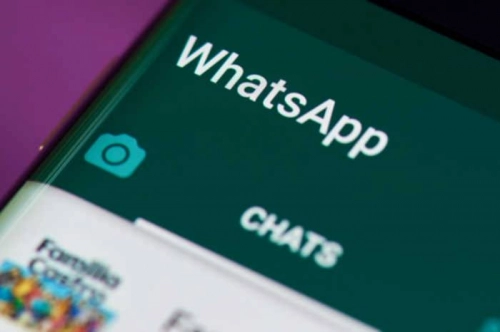EntertainmentNews And PoliticsPersonal Care And BeautyHealth And LifestyleOthersMotivationalsSports And FitnessNewsHealthCelebrityIT And Computer ScienceStoriesScience And TechnologyBusiness And MoneyGeneralTechnologyBeautyQuestions And AnswersAgricultureArts And EducationFitnessPoliticsBusinessLifetipsSportsLifestyleEducationMotivationFamily And HolidaysReligion And Principles
DemuchGS
Computer Scientist : Am A Skillful Person, I Love Advertising And I Am Into Blogging, Am A Content Creator, IG: Demuchgs, Facebook: Demuch Spacial, Page: Official Demuch
Wants to meet Just Friends
Articles
561
Followers
32
profile/919images-01.jpeg
DemuchGS

SERAP Sues President Buhari Over Plan To Monitor WhatsApp Messages
~4.5 mins read
SERAP sues President Buhari over plan to monitor WhatsApp messages
15 seconds ago
Socio-Economic Rights and Accountability Project (SERAP) has filed a lawsuit against President Muhammadu Buhari, asking the court to “declare illegal and unconstitutional the plan by the administration to track, intercept and monitor WhatsApp messages, phone calls, and text messages of Nigerians and other people, as it severely threatens and violates the right to the preservation of privacy.”
The suit followed the proposal in the Supplementary Appropriation Act signed in July 2021 to spend N4.87bn to monitor private calls and messages. The amount is part of the N895.8bn supplementary budget approved by the National Assembly.
In the suit number FHC/ABJ/CS/1240/2021 filed last Friday at the Federal High Court in Abuja, SERAP is seeking: “an order of perpetual injunction restraining President Buhari and any other authority, persons or group of persons from unlawfully monitoring the WhatsApp messages, phone calls and text messages of Nigerians and other people.”
SERAP is also seeking “a declaration that any monitoring of WhatsApp messages, phone calls and text messages is oppressive and draconian, as it threatens and violates sections 37 and 39 of Nigerian Constitution 1999 [as amended]; Article 9 of the African Charter on Human and Peoples’ Rights; and Articles 17 and 19 of International Covenant on Civil and Political Rights, to which Nigeria is a state party.”
SERAP is arguing that “The plan to monitor WhatsApp messages, phone calls and text messages is an arbitrary interference by the administration into respect for family and private life, the home, and correspondence. It also fails to meet the requirements of legality, necessity, and proportionality.”
According to SERAP, “The Buhari administration has legal obligations to protect Nigerians and other people against arbitrary interference and violations of their human rights. Monitoring of WhatsApp messages, phone calls and text messages would grant free rein to government agencies to conduct mass surveillance of communications of people.”
SERAP is also arguing that “The mere threat of mass surveillance, even when secret, coupled with the lack of remedy, can constitute an interference with human rights, including the rights to privacy, freedom of expression, peaceful assembly and association.”
SERAP is further arguing that “Privacy and expression are intertwined in the digital age, with online privacy serving as a gateway to secure exercise of the freedom of opinion and expression. Therefore, targets of surveillance would suffer interference with their rights to privacy and freedom of opinion and expression whether the effort to monitor is successful or not.”
Joined in the suit as Respondents are Mr Abubakar Malami, SAN, Minister of Justice and Attorney General of the Federation; and Mrs Zainab Ahmed, Minister of Finance, Budget and National Planning.
The suit filed on behalf of SERAP by its lawyers Kolawole Oluwadare and Kehinde Oyewumi, read in part: “The powers to conduct arbitrary, abusive or unlawful surveillance of communications may also be used to target political figures and activists, journalists and others in the discharge of their lawful activities.”
“Any spending of public funds should stay within the limits of constitutional responsibilities, and oath of office by public officers, as well as comply with Chapter 2 of the Nigerian Constitution relating to fundamental objectives and directive principles of state policy.”
“The lack of any safeguards against discriminatory decision-making, and access to an effective remedy shows the grave threats the purported plan poses to constitutionally and internationally recognized human rights.”
“Section 37 of the Nigerian Constitution and Article 17 of the International Covenant on Civil and Political Rights provide for the right to freedom from arbitrary or unlawful interference with privacy and correspondence, communications and private data.”
“Section 39 of the Nigerian Constitution and Article 19 of the Covenant also guarantee the right of everyone to hold opinions without interference and to seek, receive and impart information and ideas of all kinds, regardless of frontiers and through any media.”
“The UN General Assembly has condemned unlawful or arbitrary surveillance and interception of communications as ‘highly intrusive acts’ that interfere with fundamental human rights (see General Assembly resolutions 68/167 and 71/199).”
“Interference with privacy through targeted surveillance is designed to repress the exercise of the right to freedom of expression. Surveillance of journalists, activists, opposition figures, critics and others simply exercising their right to freedom of expression – would lead to violations of other human rights.”
“Targeted surveillance creates incentives for self-censorship and directly undermines the ability of journalists and human rights defenders to conduct investigations and build and maintain relationships with sources of information.”
SERAP is also seeking the following reliefs:
A DECLARATION that monitoring of WhatsApp messages, phone calls and text messages of Nigerians and other people is inconsistent with the principles of legality, necessity, and proportionality and amounts to threat and infringement on the rights to private and family life, access to correspondence, and freedom of expression and the press guaranteed under sections 37 and 39 of Nigeria Constitution, 1999; Article 9 of the African Charter on Human and Peoples’ Rights, and Articles 17 and 19 of International Covenant on Civil and Political Rights
A DECLARATION that the act of the Defendants budgeting N4.87bn of public money to monitor WhatsApp messages, phone calls and text messages of Nigerians and other people is unlawful and a violation of the rights to private and family life, access to correspondence, and freedom of expression and the press
AN ORDER setting aside the budget line of N4.87bn to monitor WhatsApp messages, phone calls and text messages of Nigerians and other people for being inconsistent and incompatible with constitutional provisions, and international human rights treaties
AN ORDER mandating the 1st Respondent to redirect public funds in the sum of N4.87bn budgeted to monitor WhatsApp messages, phone calls and text messages of Nigerians and other people to improve the working conditions of healthcare practitioners and improve public healthcare facilities across Nigeria
AND FOR SUCH FURTHER ORDER OR ORDERS that this Honourable Court may deem fit to make in the circumstances.
No date has been fixed for the hearing of the suit.
profile/919images-01.jpeg
DemuchGS

Facebook Bans Nearly 1,000 Militarized Social Movements Documents
~2.0 mins read
Facebook bans nearly 1,000 ‘militarized social movements’ – documents
FILE PHOTO - A 3D-printed Facebook logo is seen placed on a keyboard in this illustration taken March 25, 2020. REUTERS-Dado Ruvic-Illustration-File Photo
Facebook has placed at least 986 groups on a private list of banned “militarized social movements,” according to internal Facebook documents published by The Intercept. The documents hint at the scale of militia organizing on Facebook — something the company cracked down on in August of 2020.
Militarized social movements are one part of Facebook’s larger “dangerous individuals and organizations” list, which The Intercept published a snapshot of in its entirety. The term refers to armed groups that promote armed conflict, as well as groups that support violence or looting at protests; in practice, it’s apparently composed largely of right-wing militias with some left-wing, anarchist, or generally anti-government organizations.
Facebook’s “dangerous individuals” list also includes white supremacist bands, hate groups like the Ku Klux Klan, and branches of Al Qaeda and other global terrorist organizations. All are banned from maintaining pages, groups, or profiles on the service. Beyond that, the categories are sorted into tiers. Tier 1 includes hate and terror groups, and Facebook users can’t express praise or support for them in any form. Tier 2 includes “violent non-state actors” like armed rebels that can only be praised for nonviolent activities. Militarized social movements are designated as Tier 3, which don’t have comparable restrictions on how users discuss them.
Facebook noted in October of 2020 that it had identified 600 militarized social movements and removed around 2,400 pages and 14,200 groups maintained by them. The company also said it had removed 1,700 pages and 5,600 groups associated with QAnon — which is designated a militarized social movement but is not an organized group.
As The Intercept notes, the group designations can be fuzzy. One subset of the violent boogaloo movement, for instance, is classified as a Tier 1 terrorist organization, while the larger movement is a militarized social movement. The designation also includes news outlets like the anarchist site It’s Going Down — which could theoretically have been grouped under the umbrella of “supporting violent acts amid protests” but is listed as an “armed militia group.”
Facebook has been criticized for both overly lax and overly punitive enforcement. But most recently, it’s come under general scrutiny for not releasing details about its operations to outside researchers or policymakers, something that makes it more difficult to evaluate its moderation strategy.
In statements to The Verge, Facebook said it had not previously released the list because publishing too many details might compromise the effectiveness of moderation.
“This is an adversarial space, so we try to be as transparent as possible while also prioritizing security, limiting legal risks, and preventing opportunities for groups to get around our rules,” said counterterrorism and dangerous organizations policy director Brian Fishman.
Advertisement

Link socials
Matches
Loading...
